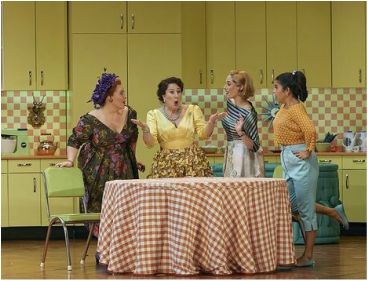 Sir John is no match for these four women (photo: Michael Cooper).
Sir John is no match for these four women (photo: Michael Cooper). What is an “operatic fundamentalist”? This term (of my own devising) denotes an opera fan who believes that moving an opera out of its originally ordained time and place is a mortal sin. The composer is God, the librettist is His prophet, and the opera is a sacred text. What business do modern-day directors have changing things? Such presumption! Such vanity! And, inevitably, such dreadful productions!
In Carsen’s hands, Falstaff became a 1950s screwball comedy – and by updating the setting from the time of Elizabeth I to Elizabeth II, he showed us that some things don’t change much. Four centuries after Shakespeare’s time, women might gossip over lunch, husbands could be possessive and jealous, and a foolish old glutton might fancy himself a handsome ladies’ man.
His thesis proved entirely convincing – not just to the audience, but evidently also to his all-Canadian cast, who got fully behind his ideas. The result was an animated ensemble performance, firing on all cylinders.
Gerald Finley’s transformation into Sir John Falstaff was nothing short of astonishing, thanks to an impressive fat-man suit and makeup job – but mostly thanks to Finley himself. He used his rich, ample baritone to produce a wide range of colours, and threw himself around the stage in a way that was spontaneously comedic yet precisely timed. Baritone Russell Braun, as Ford, was also in fine form: vocally bright and edgy. His Ford had a kind of stiff, angry authority – but his role-within-a role, as “Mr. Fountain,” (costumed as a rich American) was well played for laughs.
Contralto Marie-Nicole Lemieux’s plummy voice and strong stage-presence made her a show-stealer as Mistress Quickly. Soprano Lyne Fortin and mezzo Lauren Segal, as Alice Ford and Meg Page, respectively, were also assets to the cast. Their big scene was in Ford’s kitchen – decked out as a modern appliance palace – as they cheerfully had Sir John thrown out the window into the river.
As Dr. Caius, Michael Colvin injected a suitably plaintive tone into his tenor voice. And soprano Simone Osborne and tenor Frédéric Antoun, as Nanetta and Fenton, made a charming couple, dripping with sweetly lyrical puppy-love. Finally, tenor Colin Ainsworth and bass Robert Gleadow fleshed out Falstaff's low-down lackeys, Bardolfo and Pistola, respectively.
On the podium, COC music director Johannes Debus kept the pace taut and lively. Under his baton, the COC Orchestra’s playing was deft and detailed, his musicians skilfully negotiating every twist and turn in Verdi’s score.
Carsen would have probably done a fine job with a Falstaff set in Shakespeare’s day. And, in such a “period” production, there’s no reason to doubt that the cast and orchestra would have also acquitted themselves well. But Carsen’s update did what updates are supposed to do: offer a fresh look at a historical work of art, and engage contemporary audiences by tapping into their own values and sensibilities.
Yes, it’s true that updated opera productions can sometimes be total train-wrecks. But this one worked brilliantly. If you don’t believe me, go see for yourself!
© Colin Eatock 2014
 RSS Feed
RSS Feed

